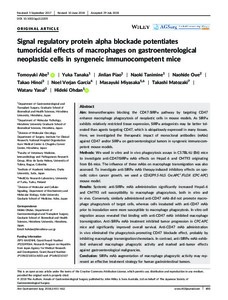Signal regulatory protein alpha blockade potentiates tumoricidal effects of macrophages on gastroenterological neoplastic cells in syngeneic immunocompetent mice
Tomoyuki Abe; Yuka Tanaka; Jinlian Piao; Naoki Tanimine; Naohide Oue; Takao Hinoi; Noel Verjan Garcia; Masayuki Miyasaka; Takashi Matozaki; Wataru Yasui; Hideki Ohdan
https://urn.fi/URN:NBN:fi-fe2021042720475
Tiivistelmä
Aim: Immunotherapies blocking the CD47-SIRP alpha pathway by targeting CD47 enhance macrophage phagocytosis of neoplastic cells in mouse models. As SIRP alpha exhibits relatively restricted tissue expression, SIRP alpha antagonists may be better tolerated than agents targeting CD47, which is ubiquitously expressed in many tissues. Here, we investigated the therapeutic impact of monoclonal antibodies (mAbs) against CD47 and/or SIRP alpha on gastroenterological tumors in syngeneic immunocompetent mouse models.
Methods: We used in vitro and in vivo phagocytosis assays in C57B1J6J (B6) mice to investigate anti-CD47/SIRP alpha mAb effects on Hepal-6 and CMT93 originating from B6 mice. The influence of these mAbs on macrophage transmigration was also assessed. To investigate anti-SIRP alpha mAb therapy-induced inhibitory effects on sporadic colon cancer growth, we used a CDX2P9.5-NLS Cre:APC7FLOX (CPC-APC) mouse model.
Results: Systemic anti-SIRP alpha mAb administration significantly increased Hepal-6 and CMT93 cell susceptibility to macrophage phagocytosis, both in vitro and in vivo. Conversely, similarly administered anti-CD47 mAb did not promote macrophage phagocytosis of target cells, whereas cells incubated with anti-CD47 mAb prior to inoculation were more susceptible to macrophage phagocytosis. In vitro cell migration assays revealed that binding with anti-CD47 mAb inhibited macrophage transmigration. Anti-SIRP alpha mAb treatment inhibited tumor progression in CPC-APC mice and significantly improved overall survival. Anti-CD47 mAb administration in vivo eliminated the phagocytosis-promoting CD47 blockade effect, probably by inhibiting macrophage transmigration/chemotaxis. In contrast, anti-SIRP alpha mAb exhibited enhanced macrophage phagocytic activity and marked anti-tumor effects against gastroenterological malignancies.
Conclusion: SIRP alpha mAb augmentation of macrophage phagocytic activity may represent an effective treatment strategy for human gastrointestinal tumors.
Kokoelmat
- Rinnakkaistallenteet [27094]
